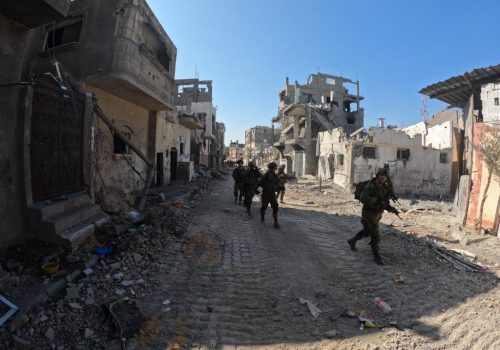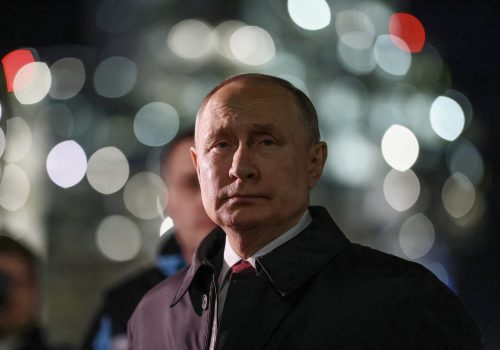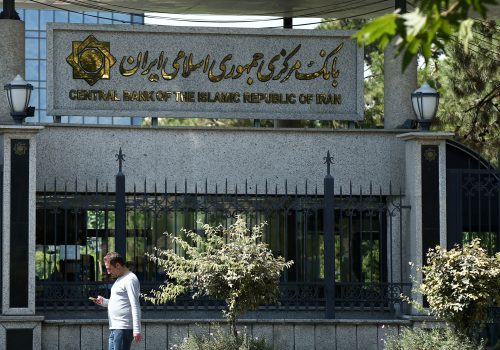Five questions and answers about South Africa’s genocide case against Israel
On December 29, 2023, South Africa brought a case against Israel at the International Court of Justice (ICJ) in The Hague over allegations of genocide against the Palestinian people. Hearings on South Africa’s request for provisional measures are being held on January 11 and 12. The Atlantic Council’s Lisandra Novo, who previously was a judicial fellow at the ICJ, explains what you need to know about the case and what to expect going forward.
1. Why is South Africa bringing this case at the ICJ?
First, the ICJ was created in 1945 by the United Nations Charter after World War II. It is the main judicial body of the United Nations (UN) and all member states can bring cases before it under treaties, by agreement, or another form of consent. Certain organizations can also ask the court to issue a nonbinding advisory opinion on a legal question. The ICJ rules on questions of state responsibility—that is, on when a state has violated a rule of international law or an international legal obligation. It is not a criminal court. It does not decide, for example, on individual criminal responsibility. A different, unrelated court in The Hague, the International Criminal Court, serves this function, and South Africa, with other like-minded states, has already referred the situation in Gaza to it for investigation.
South Africa brought this case at the ICJ against Israel under the Convention on the Prevention and Punishment of the Crime of Genocide, also known as the Genocide Convention, of which both states are parties. But what does South Africa have to do with what is happening in Gaza? The Genocide Convention allows any state party to bring a case against another state party to the ICJ on issues including responsibility for genocide, conspiracy to commit genocide, or attempt to commit genocide. The ICJ recently confirmed this in a case brought by The Gambia, which accused Myanmar of committing genocide against the Rohingya population. Furthermore, South Africa’s ruling African National Congress has long shown its support for Palestinians and backed their right to self-determination, considering them to be subject to a long-standing regime of apartheid, like South Africa was.
2. How are the judges chosen?
The ICJ has fifteen judges, who are elected by the UN General Assembly and the Security Council to serve nine-year terms. Judges are nominated by UN member states through a special group, not through the state’s government. There cannot be more than one judge from any specific country at a time, and the intention is to have the judges represent different legal systems and cultures around the world. It is important to understand that even though judges are nominated by UN member states, they do not act as representatives of their country. They must perform their duties in an independent and impartial manner.
The current elected judges are from the following countries: Australia, Brazil, China, France, Germany, India, Jamaica, Japan, Lebanon, Morocco, Russia, Slovakia, Somalia, Uganda, and the United States. In February 2024, four judges (from Jamaica, Morocco, Russia, and the United States) will finish their terms and be replaced by incoming judges from Mexico, Romania, South Africa, and the United States. This marks the first time that nationals from Romania and South Africa have been elected as judges and that a national from Russia has not.
When the parties to a specific case do not have a judge of the same nationality on the bench of elected judges, they are allowed to choose someone to sit as a judge ad hoc. That means a person who will serve as an ICJ judge for that specific case only. The person the state chooses as its judge ad hoc does not need to have the nationality of that state. In this case, however, both Israel and South Africa appointed judges ad hoc who hold their respective nationalities: Dikgang Ernest Moseneke, former South African Constitutional Court deputy chief justice, and Aharon Barak, former Israeli Supreme Court president.
3. What are the allegations and what will the court rule on?
The Genocide Convention defines genocide as specific “acts committed with intent to destroy, in whole or in part, a national, ethnical, racial or religious group.” Some of the acts against members of the targeted group include killings, serious physical or mental harm, measures designed to prevent future births, or conditions purposefully designed to physically destroy the group or part of the group. For a situation to constitute genocide, therefore, both the specific acts and the specific intent to destroy a group must be proven. It is not enough to show that atrocities have been committed—the intention by the responsible actors to destroy a group, completely or in part, must be demonstrated.
After clearly condemning the attacks carried out by Hamas on October 7 and recognizing the significance of bringing a case on genocide against Israel, South Africa states in its application to institute proceedings that “[n]o armed attack on a State’s territory no matter how serious—even an attack involving atrocity crimes—can, however, provide any possible justification for” violations of the Genocide Convention. It claims that Israel has committed and failed to prevent genocidal acts, including killings, serious bodily and mental harm, and imposing conditions “intended to bring about the destruction of a substantial part of the Palestinian national, racial and ethnical group, that being the part of the Palestinian group in the Gaza Strip.” South Africa also claims that Israel has failed to “prevent or punish the direct and public incitement to genocide by senior Israeli officials and others.” In its oral argument, it recounted that 23,000 Palestinians have died thus far, described the destruction of homes and infrastructure in Gaza, and lamented the lack of humanitarian assistance reaching a besieged civilian population.
South Africa has asked the court to rule that Israel has violated its obligations under the Genocide Convention; that it must stop any genocidal acts; ensure that people committing or inciting genocide are punished; collect and preserve (or allow for the collection and preservation of) evidence of genocidal acts against Palestinians in Gaza; and issue reparations, including allowing displaced Palestinians to return to their homes, reconstruct what it destroyed in Gaza, and ensure respect for the human rights of Palestinians in Gaza, among others. More for the public than for the court, which understands this point well, South Africa’s legal team explained that they are not bringing a case against Hamas because it is not a state and thus cannot be a party to the Genocide Convention, nor can it be brought before the ICJ (where only states can be parties to cases, not groups or individuals).
During its oral argument on January 12, Israel recalled that it was the Holocaust that pushed the international community to create the Genocide Convention and observed that the Hamas October 7 attacks are the worst violence committed against the Jewish people since the Holocaust. It vehemently denied all allegations that it was responsible for genocide and said South Africa’s account of the facts was partial and decontextualized.
Israel framed its actions under the right of self-defense in the conflict against Hamas and said the proper legal framework is the law of armed conflict but acknowledged that Hamas’s atrocities do not absolve Israel of its legal obligations. It provided numerous quotes from officials saying the fight was not against the Palestinian people to dispute arguments regarding genocidal intent. Speaking to South Africa’s request that the ICJ rule on the obligations of state parties to the Genocide Convention to prevent genocide, Israel argued that the failure to prevent genocide is indeed in question, but with respect to states that have supported and praised what Israel has qualified as genocidal attacks carried out by Hamas. It said the request for a provisional measures order for Israel to end its military operations would render it helpless against ongoing attacks. Finally, Israel urged the court to deny all provisional measures requested and dismiss the case.
4. How long will the case take?
The case itself will likely take many years to conclude. Prior cases under the Genocide Convention at the ICJ against Serbia, for example, took more than a decade before a final decision was issued. Right now, however, the court is addressing South Africa’s request for provisional measures. That is what the January 11-12 hearings in The Hague are about. Provisional measures are emergency measures the court can order the parties to take to prevent irreversible damage to a right directly linked to the case at issue.
Importantly, the court will not be ruling on whether Israel has committed genocide at this phase—it will only rule on provisional measures. The party requesting the provisional measures only needs to convince the court that its allegations are plausible. South Africa has requested the court to order Israel, among other things, to suspend its military operations, take all measures necessary to prevent genocide, and to refrain from killing, injuring, or committing other acts constituting genocide against Palestinians. Orders from the court, including on provisional measures, are binding on the parties but the court does not have its own enforcement mechanism. The ICJ, for example, has previously ordered Russia to cease its military operations in Ukraine in its provisional measures decision in the case brought by Ukraine, but thus far Russia has ignored it.
Due to the urgency of provisional measures and the risk of irreparable harm, this phase takes priority over all others and is typically resolved in a matter of weeks. In the case Ukraine brought against Russia, the hearing on provisional measures was held on March 7, 2022, and the court issued its decision on March 16, 2022. In the case brought by The Gambia against Myanmar, the hearing began on December 10, 2019, and the court issued its decision on January 23, 2020.
Given Israel’s comments during its January 12 arguments on the existence of a dispute between the parties, a requirement for jurisdiction, it seems likely it will raise preliminary objections on jurisdiction or admissibility, claiming the court cannot hear the case on procedural grounds. If so, the court would first turn to those issues. Myanmar, for example, raised preliminary objections on jurisdiction and admissibility on January 20, 2021, after which The Gambia presented its brief in April 2021 and then oral hearings were held at the end of February 2022. The court issued its decision on preliminary objections on July 22, 2022. Now in the merits phase, written pleadings are still expected as late as December 2024, after which the court will announce the next steps.
If Israel does not raise preliminary objections, or the court dismisses them, the case will proceed to the merits phase, that is, whether Israel has violated its obligations under the Genocide Convention. During that final phase, South Africa will present its case on why Israel has committed or failed to prevent genocide in Gaza, and Israel will present its defense on why it has not. The court will then analyze all the pleadings submitted to it as well as evidence or any testimony presented during hearings and make a final decision.
5. What are other states saying?
Unsurprisingly, the response from other states to this case has been divided. On the same day South Africa filed its application, the Palestinian Authority’s foreign ministry welcomed the case and called for the international community to support the proceedings. The Organization of Islamic Cooperation was similarly supportive, calling on the court to “take urgent measures to stop this mass genocide.” UN human rights experts also welcomed the case and praised South Africa “for bringing this case to the ICJ at a time when the rights of Palestinians in Gaza are being violated with impunity.” Other states that support South Africa’s application include Malaysia, Turkey, Jordan, Pakistan, Bolivia, Colombia, and Brazil.
Israel, of course, also has its strong supporters. Germany, one of Israel’s closest European allies, has called the claim that Israel is committing genocide false and said it is not covered by the Genocide Convention. Hungary has also expressed its opposition to the case. The United States, for its part, has said the allegations against Israel “are unfounded” and called the submission at the ICJ “meritless, counterproductive, and completely without any basis in fact whatsoever.” It has been reported that UK Foreign Secretary David Cameron said that he did not think the case at the ICJ was helpful and that the United Kingdom’s view is that “Israel has a right to defend itself.” In Latin America, Guatemala and Paraguay have also backed Israel and affirmed its right to self-defense.
So far, no state has filed a formal declaration to intervene in the case. However, on Tuesday, Belgian Deputy Prime Minister Petra De Sutter said she would encourage Belgium to officially support South Africa in the case. Conversely, Ireland and Austria have said they do not intend to intervene. In the case brought by Ukraine against Russia under the Genocide Convention, for example, a record-breaking thirty-two states have intervened in the case as non-parties. It is too soon to tell whether any of those same thirty-two states, all parties to the Genocide Convention, will intervene in the case brought by South Africa.
Lisandra Novo is a staff lawyer for the Strategic Litigation Project at the Atlantic Council. She was previously a judicial fellow at the ICJ, a Fulbright scholar in Spain researching post-conflict transitional justice, and a visiting professional at the Inter-American Court of Human Rights.
Further reading
Tue, Oct 31, 2023
Israel claims it is no longer occupying the Gaza Strip. What does international law say?
MENASource By Celeste Kmiotek
The laws of occupation codify a basic principle of humanity: those with effective control over a population have obligations to protect it.
Thu, Nov 30, 2023
Putin has been accused of starving civilians as a warfare tactic. Will the ICC agree?
New Atlanticist By Alana Mitias, Celeste Kmiotek
New evidence about Russia’s actions in Ukraine offers the ICC an opportunity to prosecute starvation as a war crime or crime against humanity affecting Ukrainians and other global victims.
Mon, Apr 24, 2023
What the ICJ ruling on the Central Bank of Iran means for the US and the Islamic Republic—and those seeking reparations for state-sponsored atrocities
IranSource By Celeste Kmiotek
On March 30, the International Court of Justice issued its final judgment on a case between the Islamic Republic of Iran and the United States on the fate of “Certain Iranian Assets.” The judgment contains wins and losses for both sides.
Image: People sit inside the International Court of Justice (ICJ) on the day of the trial to hear a request for emergency measures by South Africa, who asked the court to order Israel to stop its military actions in Gaza and to desist from what South Africa says are genocidal acts committed against Palestinians during the war with Hamas in Gaza, in The Hague, Netherlands, January 11, 2024. REUTERS/Thilo Schmuelgen


